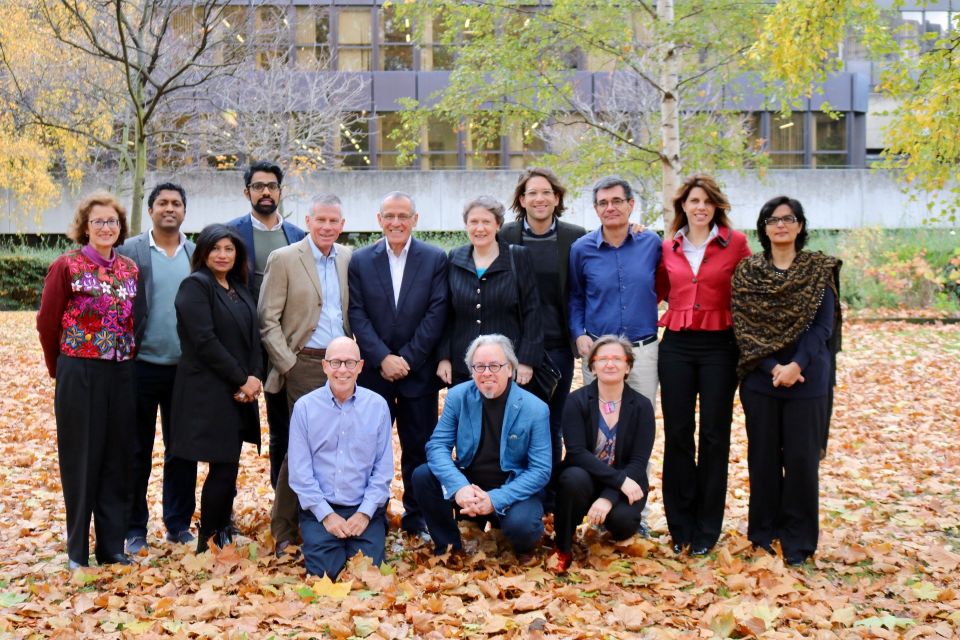Professor Sarah Hawkes
Twitter: @feminineupheave
London, 21 November 2017
What would a more strategic and coordinated approach to supporting countries to ensure that people not only survive but that populations can prevent disease and stay healthy was the question which brought together a diverse global group of health and development specialists.
The starting point for the day-long discussion was a shared concern that the global health system is not well set to effectively address the structural, social and commercial determinants of the major emerging burdens of disease – including non-communicable diseases, mental health, road traffic fatalities and diseases associated with environmental degradation, poor urban planning and unsustainable patterns of consumption.
While such burdens of ill-health are gaining traction on health agendas, there is a tendency to mainly focus on health care services once people are ill and to manage public emergencies as they occur . While these are necessary interventions, evidence suggests that they are insufficient to have the kind of population level impact required to stem the personal, societal and economic costs associated with them.
Meeting participants identified key opportunities associated with the United Nations Agenda 2030 on Sustainable Development to focus on improving healthy lives, rather than merely survival and disease control. Such opportunities often lie at the intersections of the goals of Agenda 2030, particularly those focusing on health, sustainable production and consumption, strong institutions and gender equality.
The discussion was hosted by Professor Sarah Hawkes of the UCL Centre for Global Health and co-convened by Dr Kent Buse of UNAIDS and Dr Anders Nordstrom of the Ministry of Foreign Affairs, Sweden with support from the Swedish Ministry of Foreign Affairs and the UK’s Medical Research Council.

Participants:
Ala Alwan, Former Regional Director, EMRO, Visiting Professor University of Washington, Dept of Global Health
Kent Buse, Chief of Strategic Policy Directions, UNAIDS
Hilda Davila Chavez, Director General of International Relation, Ministry of Health, Mexico
Helen Clark, Former Prime Minister of New Zealand and Administrator, UNDP
Sandro Demaio, Medical Officer, Non-Communicable Diseases and Nutrition, WHO, Geneva
Andrea Feigl, Health Economist OECD, Population Health Scientist, Harvard University
Peter Friberg, Co-founder and Director of SIGHT, Sweden
Sharon Friel, Director of School of Regulation and Global Governance, Australian National University
Unni Gopinathan, Research Fellow, University of Oslo
Sarah Hawkes, Professor of Global Public Health, University College London, Director of UCL Centre for Gender and Global Health
Richard Horton, Editor-in-Chief, The Lancet, UK
Nancy Lee, Global Policy Lead and Senior Advisor, The Wellcome Trust, UK
Selina Lo, Senior Editor, The Lancet, UK
Sania Nishtar, Founder and President of Heartfile,Pakistan
Anders Nordstrom, Ambassador for Global Health, Swedish Ministry for Foreign Affairs
Phusit Prakongsai, Acting Senior Advisor on Health Promotion, Ministry of Public Health, Thailand
Michel Sidibé, Executive Director, UNAIDS
Sandhya Singh, Director of Disease, Disability and
Geriatrics, Dept of Health, Republic of South Africa
Sudhvir Singh, Director of Policy, EAT Foundation, Oslo
Jamie Uhrig, Independent Consultant, New York
"The world is disturbingly off track to meet targets for non-communicable diseases, mental health, road traffic injuries and others; it is therefore important that universities can serve as neutral platforms to bring together committed, talented and diverse people to explore new and urgently needed approaches."
Helen Clark, former Prime Minister of New Zealand
"Partnerships will be critical to addressing the upstream cross-sector determinants of health - but my experience suggests that leadership, shared ownership and responsibility for inter-sectoral and ministerial collaboration is an Agenda 2030 challenge which demands further thinking and action."
Sania Nishtar, Founder, Heartfile, Pakistan
Health is no longer a matter only for the "health sector – it is time to rethink the global system for health moving from the MDGs to Agenda 2030."
Anders Nordstrom, Ambassador for Global Health, Sweden
"I am a firm believer in the right to treatment and universal health coverage, but am convinced that we must do more to prevent people from falling ill – and that means addressing the social and economic drivers in other sectors in a more strategic way."
Kent Buse, Chief, Strategic Policy Directions, UNAIDS
"Seldom have I attended such a happy and constructive meeting to reflect on the challenges we are facing to put people's wellbeing and health at the centre of the global health agenda."
Hilda Davila Chavez, Director General of International Relations, Ministry of Health, Mexico
"How do we organize societies, institutions, communities and people to achieve good health and wellbeing for all? This lies at the heart of what it means to be a fair and just society, and it’s an honour to host such a stimulating and thoughtful group of people dedicated to moving the agenda on from diagnosing the problem to addressing the underlying causes."
Sarah Hawkes, Professor of Global Public Health, UCL